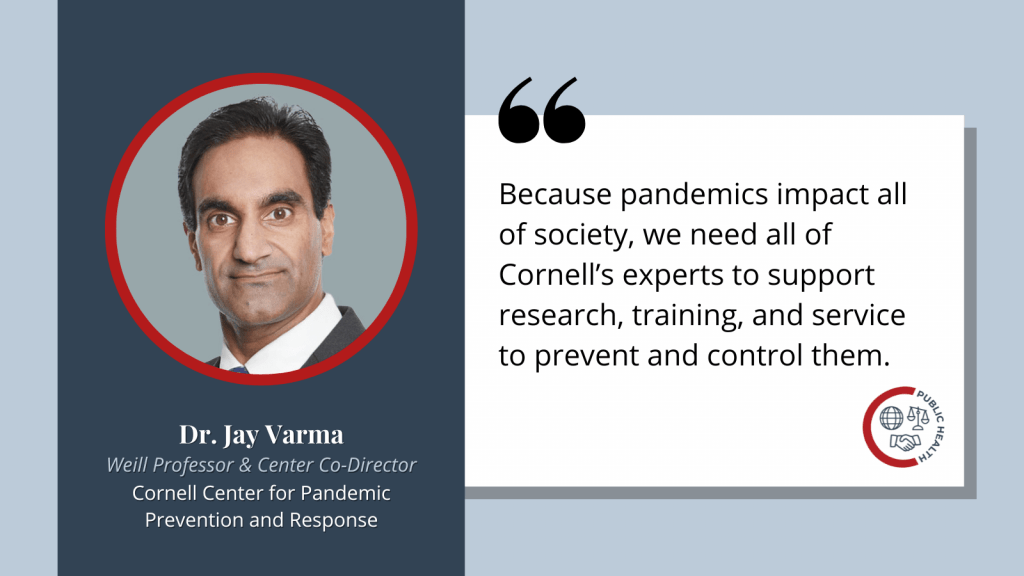Center for Pandemic Prevention
 In 2022, Cornell and Weill Cornell Medicine announced the new Cornell Center for Pandemic Prevention and Response (CCPPR). Addressing something as far-reaching as a pandemic requires close collaboration across historically siloed disciplines, and Cornell’s strengths position it to develop the transdisciplinary teams of faculty, students, and organizational partners necessary for effective prevention, prediction, protection, preparedness, and response. In doing so, CCPPR represents Cornell’s ongoing commitment to bringing disciplines together—including human and veterinary medicine, disease diagnostics and epidemiology, microbiology and immunology, social sciences and policy, ecosystem services and wildlife ecology, and city and regional planning.
In 2022, Cornell and Weill Cornell Medicine announced the new Cornell Center for Pandemic Prevention and Response (CCPPR). Addressing something as far-reaching as a pandemic requires close collaboration across historically siloed disciplines, and Cornell’s strengths position it to develop the transdisciplinary teams of faculty, students, and organizational partners necessary for effective prevention, prediction, protection, preparedness, and response. In doing so, CCPPR represents Cornell’s ongoing commitment to bringing disciplines together—including human and veterinary medicine, disease diagnostics and epidemiology, microbiology and immunology, social sciences and policy, ecosystem services and wildlife ecology, and city and regional planning.
At local, national, and global levels, CCPPR will also engage with citizens, health agencies, governments, non-governmental community and global organizations, and the private sector. In partnership with the Cornell Atkinson Center for Sustainability, CCPPR hosted two town halls this year that have helped shape the center and its objectives. “Cornell Atkinson’s work on sustainability is the model for doing this successfully, and has been critical to helping us launch CCPPR,” says Dr. Jay Varma, professor of Population Health Sciences at Weill Cornell Medicine and co-director of the new center, along with Dr. Alexander Travis, Cornell MPH Program director.
Dr. Varma joined Weill Cornell Medicine in 2021, after a two-decade career with the U.S. Centers for Disease Control and Prevention. In June, he helped raised national attention and resources for the monkeypox outbreak through media appearances, an essay in The New York Times, and serving on a New York State-wide online discussion panel called Monkeypox: Responding to an Emerging Outbreak.
Since most new infectious disease threats arise in animals and become amplified through factors in the environment, pandemic prevention—the first of CCPPR’s five pillars—largely depends on nature-based solutions and changing human behaviors related to food production, animal markets, landscapes, and natural resources. Dr. Raina Plowright, a lauded ecologist and epidemiologist, will support the Center’s prevention agenda. Dr. Plowright, who joined the MPH Program faculty in 2022, conducts research with large, global, transdisciplinary teams. Together, they demonstrate how ecological countermeasures, such as the restoration and preservation of natural habitats, “can actually stop pathogen spillover events” between animal species, including bats, she says. “Pathogen spillover” refers to a virus or bacterium moving from one species to another. “Our Center is unique among peer institutions in that we work to prevent disease emergence and spillover, rather than just responding to pandemics and acute health threats that have already occurred,” notes Dr. Travis.

At the same time, “policy needs to be a part of all five pillars,” says Dr. Travis, and the global shifts needed to actively prevent, predict, protect, prepare for, and respond to the next pandemic will only be possible with buy-in from local and national governments. “Our Center is committed to being rapidly and effectively responsive to the dynamic needs of health agencies and communities during emergencies, and to preventing emergencies as best we can in the first place,” he says.
This summer, CCPPR launched its first request for proposals for seed grants to fund interdisciplinary projects that align with the Center’s five pillars. Selected projects must describe a clear pathway to impact for changing policy, building capacity, or improving prevention, diagnosis, or treatment in collaboration with nonacademic partners.
Written by Audrey Baker

